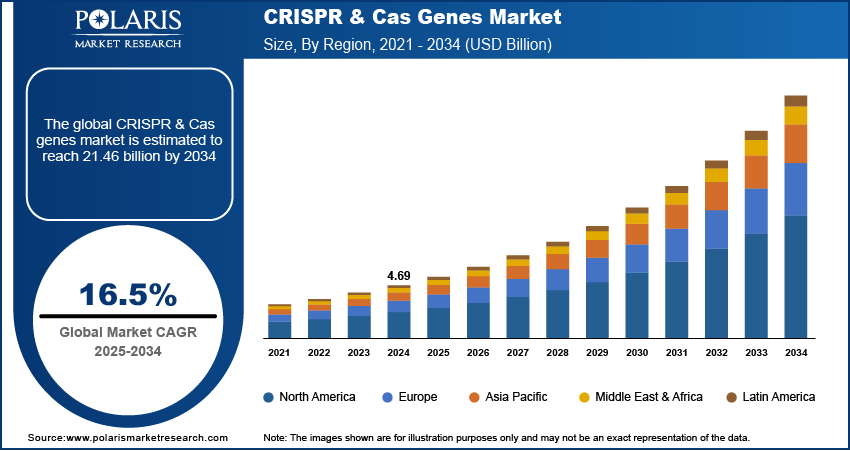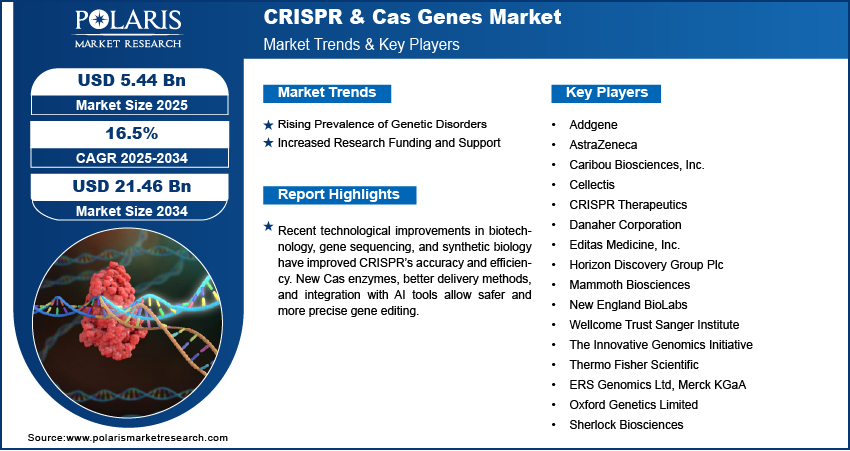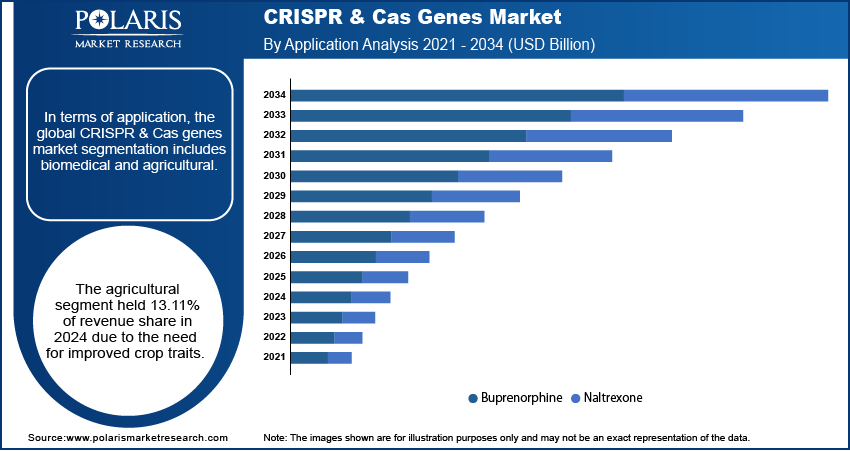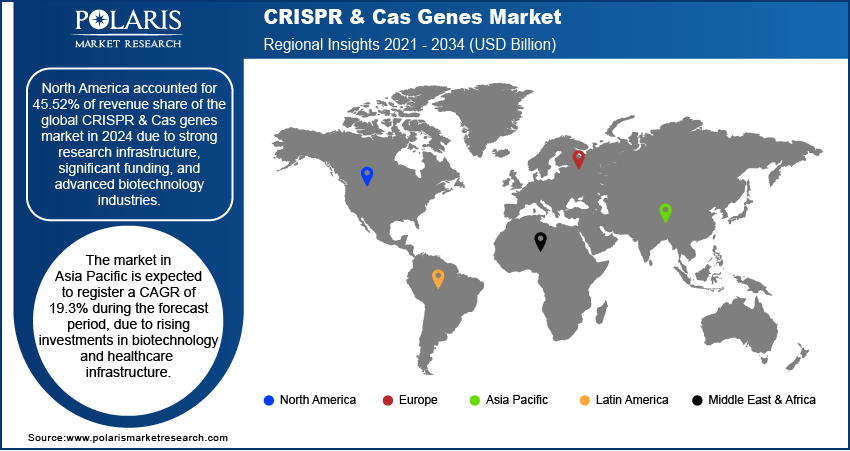
CRISPR & Cas Genes Market Size, Share, Trends, Industry Analysis Report
By Product (Kits & Enzymes, Libraries), By Service, By Application, By End Use, By Region – Market Forecast, 2025–2034
- Published Date:Sep-2025
- Pages: 117
- Format: PDF
- Report ID: PM1738
- Base Year: 2024
- Historical Data: 2020-2023
Overview
The global CRISPR & Cas genes market size was valued at USD 4.69 billion in 2024, growing at a CAGR of 16.5% from 2025 to 2034. Key factors driving the growth are the rising prevalence of genetic disorders, increased research funding and support, and technological improvements in biotechnology, gene sequencing, and synthetic biology.
Key Insights
- The kits & enzymes segment is expected to register a CAGR of 19.1% during the forecast period, driven by their crucial role in gene-editing experiments.
- In 2024, the agricultural sector accounted for 13.11% of the revenue share, fueled by the demand for enhanced crop traits. Gene editing enables the development of plants that are pest-resistant, drought-tolerant, and yield higher production, helping to tackle global food security issues.
- North America dominated the global CRISPR & Cas genes market with 45.52% of the revenue share in 2024, supported by strong research infrastructure, substantial funding, and advanced biotech industries.
- Within North America, the U.S. contributed 96.71% of the revenue share in 2024, due to heavy investments from leading academic institutions and pharmaceutical companies in genome editing research.
- The Asia Pacific market is projected to register a CAGR of 19.3% during the forecast period, driven by increasing investments in biotechnology and healthcare infrastructure.
Industry Dynamics
- Rising prevalence of genetic disorders is driving the demand for this technology.
- Increased research funding and support fuels the CRISPR & Cas genes market.
- Recent technological improvements in biotechnology, DNA sequencing, and synthetic biology have improved CRISPR’s accuracy and efficiency.
- High regulatory complexities and ethical concerns around gene editing technologies hinder the rapid adoption.
Market Statistics
- 2024 Market Size: USD 4.69 Billion
- 2034 Projected Market Size: USD 21.46 Billion
- CAGR (2025–2034): 16.5%
- North America: Largest Market Share
AI Impact on CRISPR & Cas Genes Market
- AI accelerates gene-editing research by rapidly analyzing large genomic datasets, enabling the identification of precise target sites for CRISPR & Cas gene modifications.
- Integration of AI allows predictive modeling to optimize enzyme design and reaction conditions, improving efficiency and accuracy in gene-editing experiments.
- AI-powered analytics help researchers understand complex biological pathways and off-target effects, enhancing safety and effectiveness of CRISPR-based therapies.
- AI automates data processing and workflow management in laboratories, reducing experimental errors, lowering costs, and speeding up the development of gene-editing products.
CRISPR-Cas genes refer to a natural bacterial defense system used for gene editing. The CRISPR sequences guide the Cas enzyme to specific DNA locations to make precise cuts. This technology enables targeted modification of genes for research and therapeutic purposes.
CRISPR-Cas genes have transformed genetic research by enabling fast, accurate, and affordable editing of DNA. This technology allows scientists to target specific genes in plants, animals, and humans, opening new possibilities in medicine, agriculture, and biotechnology. Its ease of use compared to older gene-editing methods has led to widespread adoption in laboratories worldwide. The demand for related enzymes, kits, and reagents has surged as more researchers use CRISPR tools for gene modification. The continuous innovation in CRISPR systems further drives the growth, expanding applications and increasing investments in this technology.

Recent technological improvements in biotechnology, gene sequencing, and synthetic biology have improved CRISPR’s accuracy and efficiency. New Cas enzymes, better delivery methods, and integration with AI tools allow safer and more precise gene editing. These advances enable broader applications in drug discovery, diagnostics, and agriculture. CRISPR-based products become more reliable and versatile as these supporting technologies evolve. This growing adoption of technological advancements boosts the demand for advanced gene-editing tools and services. Therefore, continuous innovation in biotechnology fuels growth for the CRISPR & Cas genes industry worldwide.
Drivers & Opportunities
Rising Prevalence of Genetic Disorders: The increasing incidence of genetic disorders such as cystic fibrosis, sickle cell anemia, and inherited cancers is driving the need for effective gene therapies. According to the Cystic Fibrosis Foundation, in 2024, 100,792 people had clinical visits for cystic fibrosis related problems. CRISPR technology offers the potential to correct faulty genes at their source, providing hope for treatment or cures. The demand for CRISPR-based therapeutic solutions rises as healthcare providers and patients seek innovative options for managing genetic diseases. Pharmaceutical companies and research organizations focus on developing gene-editing treatments, fueling the growth.
Increased Research Funding and Support: Governments, academic institutions, and private companies globally are investing more in CRISPR research due to its vast potential. Locus Bioscience, a biotechnology company that utilizes CRISPR Cas systems for antibacterial therapies, raised USD 35 million in Series 2 funding. Significant funding supports the development of new gene-editing tools, therapies, and agricultural products. This financial backing accelerates innovation, facilitates clinical trials, and enables startups and established firms to scale their operations. Additionally, collaborations between research centers and industries fuel growth. Increasing investment expands research infrastructure and improves technology accessibility, thereby propelling the growth.

Segmental Insights
Product Analysis
Based on product, the segmentation includes kits & enzymes, libraries, design tool, antibodies, and other products. The kits & enzymes segment is projected to grow at a CAGR of 19.1% over the forecast period, driven by their essential role in gene-editing experiments. Kits provide researchers with ready-to-use components, saving time and improving accuracy. Enzymes such as Cas9 are crucial for cutting DNA at specific locations, enabling precise gene modifications. The need for high-quality, reliable kits and enzymes grows as more labs adopt CRISPR technology. Moreover, continuous improvements in enzyme efficiency and kit convenience further encourage adoption, fueling segment expansion in both academic and commercial research sectors.
Service Analysis
Based on service, the segmentation includes cell line engineering, gRNA design, microbial gene editing, and DNA synthesis. Microbial gene editing segment is expected to witness a significant share over the forecast period due to their ability to improve industrial biotechnology, pharmaceuticals, and agriculture. Editing microbes allows for improved production of biofuels, enzymes, and antibiotics, making processes more cost-effective and sustainable. Companies seek expert services to customize microbes for specific applications without investing heavily in in-house capabilities. The rise of synthetic biology and microbiome research further supports this growth. The microbial gene editing services become vital as industries focus on innovation and efficiency, thereby fueling the segment growth.
Application Analysis
In terms of application, the segmentation includes biomedical and agricultural. The agricultural segment held 13.11% of revenue share in 2024 due to the need for improved crop traits. Gene editing helps develop plants that resist pests, tolerate drought, and produce higher yields, addressing global food security challenges. Unlike traditional GMOs, CRISPR offers precise, faster, and more accepted modifications. Governments and private sectors increasingly support gene-editing research in agriculture, accelerating adoption. This demand for better, sustainable crops propels growth, thereby making agriculture a major application area for CRISPR technology.
End Use Analysis
In terms of end use, the segmentation includes biotechnology & pharmaceutical companies, academics & government research institutes, and contract research organizations (CROs). The contract research organizations (CROs) segment held significant revenue share in 2024, holding 14.97% as they are focused on providing expert CRISPR services to biotech and pharmaceutical firms. Outsourcing gene-editing projects to CROs reduces costs and accelerates research timelines. CROs offer scalable, specialized solutions for preclinical and clinical studies, helping companies advance drug discovery and gene therapies efficiently. Rising CRISPR adoption in medicine increases demand for such outsourced services. CROs’ ability to handle complex projects and meet regulatory standards makes them vital partners, thereby fueling the growth of the segment.

Regional Analysis
The North America CRISPR & Cas genes market accounted for 45.52% of global revenue share in 2024 due to strong research infrastructure, significant funding, and advanced biotechnology industries. The region’s robust presence of pharmaceutical and biotech companies accelerates CRISPR adoption in drug discovery and gene therapies. Supportive government policies and substantial investments in genome editing fuel innovation. High awareness and availability of skilled professionals further boost growth. Continuous product launches and collaborations in North America further improve access to advanced CRISPR tools, thereby fueling the growth in the region.
U.S. CRISPR & Cas Genes Market Insights
The U.S. held 96.71% of the revenue share in North America in 2024, as leading academic institutions and pharmaceutical companies invest heavily in genome editing research. Strong government funding through agencies such as NIH supports development and clinical trials. The U.S.’s regulatory environment is increasingly favorable, accelerating product approvals. A high number of biotech startups and CROs offering CRISPR services further expand reach. Increasing collaborations between the public and private sectors drive innovation. The country’s leadership in technology development and commercialization further boosts the growth in the region.
Asia Pacific CRISPR & Cas Genes Market Trends
The market in Asia Pacific is expected to register a CAGR of 19.3% during the forecast period due to rising investments in biotechnology and healthcare infrastructure. Countries such as China, India, and Japan focus on advancing gene-editing technologies to address healthcare challenges. Expanding research centers and increasing collaborations with global firms boost technology adoption. Growing agricultural and pharmaceutical sectors create demand for CRISPR applications. Supportive government initiatives and favorable regulatory reforms encourage innovation. The region’s large population offers a broad base for clinical trials and applications further driving the growth of industry in the region.
China CRISPR & Cas Genes Market Overview
The demand for these technologies in China is rising due to strong government support and high investments in biotechnology. Chinese research institutes actively pursue genome-editing advancements, particularly in agriculture and medicine. Expanding collaborations with international companies facilitate technology transfer. The increasing number of clinical trials and agricultural projects using CRISPR further supports demand. China’s large population and growing biotech talent pool create favorable conditions for rapid CRISPR adoption, thereby fueling the growth in the country.
Europe CRISPR & Cas Genes Market Analysis
The industry in Europe is projected to grow at a CAGR of 18.3% from 2025 to 2034, due to strong research funding, advanced biotech industries, and growing adoption of gene-editing technologies. The European Union supports innovation through grants and regulatory frameworks that encourage responsible genome editing. Increasing collaborations between academic institutions and pharmaceutical companies accelerate development. Rising demand for CRISPR in healthcare, agriculture, and industrial biotech fuels growth. Additionally, Europe’s focus on ethical standards and safety builds public trust, aiding acceptance. The region’s diverse biotech hubs and skilled workforce drive expansion in the region.

Key Players & Competitive Analysis
The CRISPR & Cas genes market is characterized by intense competition driven by rapid technological advancements, patent-driven innovation, and expanding application areas. Companies operating in this space are focusing on developing advanced gene-editing tools with improved precision, efficiency, and reduced off-target effects. The market is witnessing a strong trend of strategic partnerships, licensing agreements, and collaborations to access proprietary technologies and broaden research capabilities. Additionally, firms are investing heavily in R&D to develop next-generation CRISPR platforms and delivery systems. A key competitive factor includes the ability to secure intellectual property rights, as well as regulatory approvals for therapeutic applications. The market is segmented across research, therapeutic, agricultural, and industrial domains, each requiring specialized capabilities. Increasing demand for personalized medicine, gene therapy, and agricultural genome editing continues to fuel competition. Startups and established players alike are racing to commercialize CRISPR-based solutions, making the landscape dynamic and innovation-driven.
Key Players
- Addgene
- AstraZeneca
- Caribou Biosciences, Inc.
- Cellectis
- CRISPR Therapeutics
- Danaher Corporation
- Editas Medicine, Inc.
- ERS Genomics Ltd
- Horizon Discovery Group Plc
- Mammoth Biosciences
- Merck KGaA
- New England BioLabs
- Oxford Genetics Limited
- Sherlock Biosciences
- The Innovative Genomics Initiative
- Thermo Fisher Scientific
- Wellcome Trust Sanger Institute
CRISPR & Cas Genes Industry Developments
In May 2025, Biomay AG launched its FDA-grade CRISPR/Cas9 nuclease for off-the-shelf purchase, expanding its product portfolio. The company, an FDA-approved GMP manufacturer, provided high-quality Cas9 nuclease to support scalable and compliant gene-editing applications globally.
CRISPR & Cas Genes Market Segmentation
By Product Outlook (Revenue, USD Billion, 2021–2034)
- Kits & Enzymes
- Vector-based Cas
- DNA-free Cas
- Libraries
- Design Tool
- Antibodies
- Other Products
By Service Outlook (Revenue, USD Billion, 2021–2034)
- Cell Line Engineering
- gRNA Design
- Microbial Gene Editing
- DNA Synthesis
By Application Outlook (Revenue, USD Billion, 2021–2034)
- Biomedical
- Agricultural
By End Use Outlook (Revenue, USD Billion, 2021–2034)
- Biotechnology & Pharmaceutical Companies
- Academics & Government Research Institutes
- Contract Research Organizations (CROs)
By Regional Outlook (Revenue, USD Billion, 2021–2034)
- North America
- U.S.
- Canada
- Europe
- Germany
- France
- UK
- Italy
- Spain
- Netherlands
- Russia
- Rest of Europe
- Asia Pacific
- China
- Japan
- India
- Malaysia
- South Korea
- Indonesia
- Australia
- Vietnam
- Rest of Asia Pacific
- Middle East & Africa
- Saudi Arabia
- UAE
- Israel
- South Africa
- Rest of Middle East & Africa
- Latin America
- Mexico
- Brazil
- Argentina
- Rest of Latin America
CRISPR & Cas Genes Market Report Scope
|
Report Attributes |
Details |
|
Market Size in 2024 |
USD 4.69 Billion |
|
Market Size in 2025 |
USD 5.44 Billion |
|
Revenue Forecast by 2034 |
USD 21.46 Billion |
|
CAGR |
16.5% from 2025 to 2034 |
|
Base Year |
2024 |
|
Historical Data |
2021–2023 |
|
Forecast Period |
2025–2034 |
|
Quantitative Units |
Revenue in USD Billion and CAGR from 2025 to 2034 |
|
Report Coverage |
Revenue Forecast, Competitive Landscape, Growth Factors, and Industry Trends |
|
Segments Covered |
|
|
Regional Scope |
|
|
Competitive Landscape |
|
|
Report Format |
|
|
Customization |
Report customization as per your requirements with respect to countries, regions, and segmentation. |
FAQ's
The global market size was valued at USD 4.69 billion in 2024 and is projected to grow to USD 21.46 billion by 2034.
The global market is projected to register a CAGR of 16.5% during the forecast period.
North America dominated the market in 2024
A few of the key players in the market are Addgene, AstraZeneca, Caribou Biosciences, Inc., Cellectis, CRISPR Therapeutics, Danaher Corporation, Editas Medicine, Inc., Horizon Discovery Group Plc, Mammoth Biosciences, New England BioLabs, Wellcome Trust Sanger Institute, The Innovative Genomics Initiative, Thermo Fisher Scientific, ERS Genomics Ltd, Merck KGaA, Oxford Genetics Limited, and Sherlock Biosciences.
The enzyme and kits segment dominated the market revenue share in 2024.
The agriculture segment is projected to witness the fastest growth during the forecast period.
CRISPR (Clustered Regularly Interspaced Short Palindromic Repeats) and Cas (CRISPR-associated proteins) are components of a gene-editing technology that allows for precise modification of DNA within living organisms. CRISPR is a natural defense mechanism found in bacteria, where it helps protect against viruses by storing segments of viral DNA and using them to recognize and cut invading viral DNA in the future. The CRISPR-Cas system has been adapted for genetic engineering, enabling scientists to target specific genes in the DNA of various organisms, including humans, animals, and plants. Cas proteins, especially Cas9, act as molecular scissors, cutting DNA at a precise location, allowing for the addition, deletion, or alteration of genetic material.
A few key CRISPR & Cas genes market trends are described below: Advancements in Gene Therapy: Increasing use of CRISPR technology for developing treatments for genetic disorders, including sickle cell anemia and muscular dystrophy. Expansion in Agricultural Biotechnology: Growing adoption of CRISPR to create genetically modified crops with improved traits such as drought resistance, pest resistance, and enhanced nutritional content. CRISPR in Drug Discovery: Rising integration of CRISPR in pharmaceutical research to discover new drug targets and accelerate drug development processes. Regulatory Progress: Improving regulatory frameworks in various regions, facilitating the development and approval of CRISPR-based therapies and genetically modified crops.
For a new company entering the CRISPR & Cas genes market, focusing on specialized applications such as gene therapies for rare genetic disorders or agricultural biotechnology could provide a competitive edge. Investing in next-generation CRISPR technologies, such as CRISPR/Cas12 or CRISPR/Cas13, which offer more precision and efficiency, would appeal to researchers and clinicians. Additionally, offering customizable CRISPR-based solutions for researchers, including reagents and tools, can cater to the growing demand in the research and academic sectors. Establishing strategic collaborations with pharmaceutical companies or academic institutions could also help accelerate R&D efforts and gain access to early clinical trials.
Companies manufacturing, distributing, or purchasing CRISPR & Cas genes and related products, and other consulting firms must buy the report.
